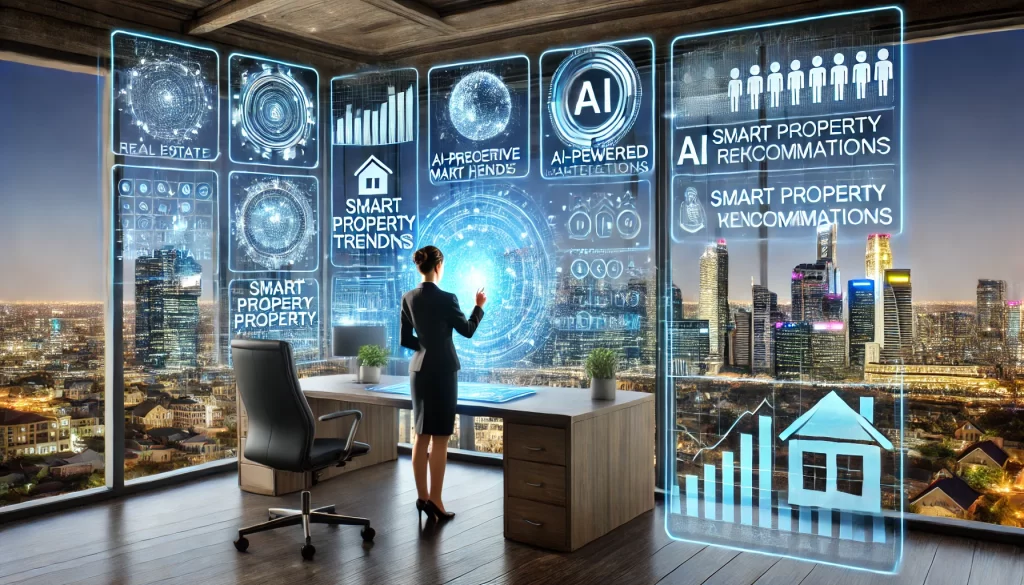How AI is Transforming the Real Estate Market
The real estate market has always been driven by data, trends, and human expertise. However, with the rapid advancement of Artificial Intelligence (AI), the industry is undergoing a significant transformation. From predictive analytics to AI-driven property valuations, technology is enhancing efficiency, accuracy, and decision-making. In this article, we’ll explore how AI is transforming the real estate market and what it means for buyers, sellers, and investors.
The Role of AI in the Real Estate Market
AI is revolutionizing real estate by automating processes, analyzing vast amounts of data, and providing actionable insights. Here are some key areas where AI is making a difference:
1. Predictive Analytics for Market Trends
AI-powered predictive analytics tools analyze past sales data, economic indicators, and consumer behavior to forecast market trends. This helps buyers and investors make informed decisions about when to buy or sell properties.
2. AI-Driven Property Valuation
Traditional property valuation methods rely on manual assessments, but AI-based tools provide more accurate and real-time valuations by considering:
- Recent sales in the area
- Property features
- Neighborhood trends
- Economic conditions
Popular platforms like Zillow’s Zestimate use AI to offer instant property valuations, enhancing transparency for buyers and sellers.
3. Virtual Assistants and Chatbots
AI-powered virtual assistants and chatbots are revolutionizing customer interactions in real estate. These tools:
- Answer queries in real time
- Schedule property tours
- Provide mortgage estimates
Platforms like ChatGPT-powered chatbots and Facebook Messenger bots enhance customer engagement, reducing the need for human agents in initial interactions.
4. Smart Property Matching
AI algorithms analyze user preferences and behavior to recommend properties based on:
- Budget
- Location
- Amenities
- Lifestyle preferences
This personalization improves the property search experience, saving buyers time and effort.
How AI Benefits Real Estate Professionals
AI isn’t just changing how buyers and sellers interact—it’s also transforming the way real estate professionals operate.
1. Automating Repetitive Tasks
AI streamlines administrative tasks such as:
- Data entry
- Lead generation
- Appointment scheduling
This allows real estate agents to focus on client relationships and negotiations.
2. AI-Powered Marketing Strategies
AI tools help agents optimize their marketing efforts through:
- Targeted online ads
- Personalized email campaigns
- AI-generated property descriptions
3. Risk Assessment for Investments
Investors use AI-driven risk assessment tools to analyze potential property investments by evaluating factors such as:
- Market volatility
- Rental yield predictions
- Property appreciation trends
AI in Smart Homes and Property Management
1. AI-Powered Smart Homes
Smart home technology, integrated with AI, is becoming a major selling point in modern real estate. Features include:
- Voice-controlled assistants (Alexa, Google Home)
- Automated climate control based on user behavior
- Security systems with facial recognition
2. AI in Property Management
For landlords and property managers, AI simplifies operations by:
- Predicting maintenance needs before breakdowns occur
- Automating rent collection and lease renewals
- Enhancing tenant screening using AI-powered background checks
Challenges and Ethical Considerations of AI in Real Estate
Despite its advantages, AI in real estate also presents challenges:
1. Data Privacy Concerns
AI relies on massive datasets, raising concerns about how user data is collected and stored.
2. Bias in AI Algorithms
AI models can inherit biases from training data, potentially leading to unfair property valuations or discriminatory lending practices.
3. Dependence on Technology
Over-reliance on AI tools may reduce the human touch in real estate transactions, affecting relationship-building between agents and clients.
The Future of AI in the Real Estate Market
AI’s role in real estate will continue to expand, with future trends including:
1. Blockchain and AI Integration
Secure and transparent property transactions using AI-driven blockchain technology.
2. Augmented Reality (AR) for Virtual Tours
AI-enhanced virtual property tours will make house-hunting more immersive and accessible.
3. AI-Powered Sustainable Housing
AI will help design eco-friendly and energy-efficient smart homes.
Conclusion
The integration of AI in real estate is reshaping how properties are bought, sold, and managed. From predictive analytics to smart homes, AI is enhancing efficiency, personalization, and accuracy in the industry. While challenges exist, the benefits outweigh the risks, making AI a game-changer for buyers, sellers, and real estate professionals alike.


